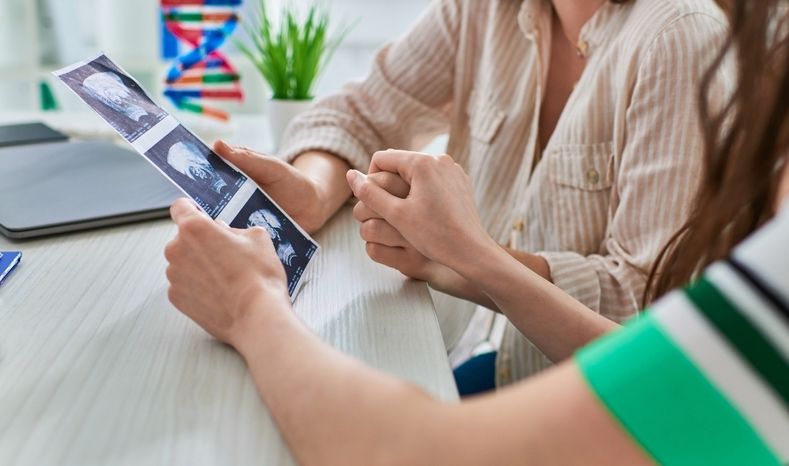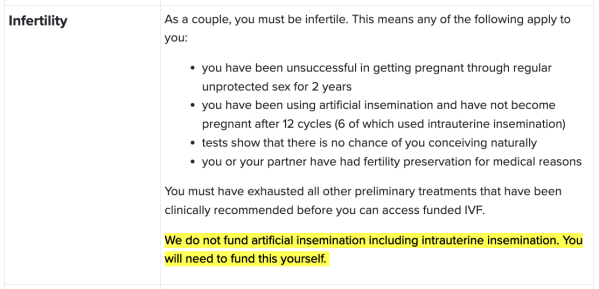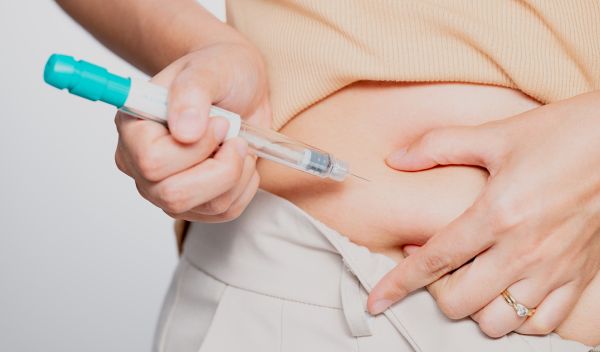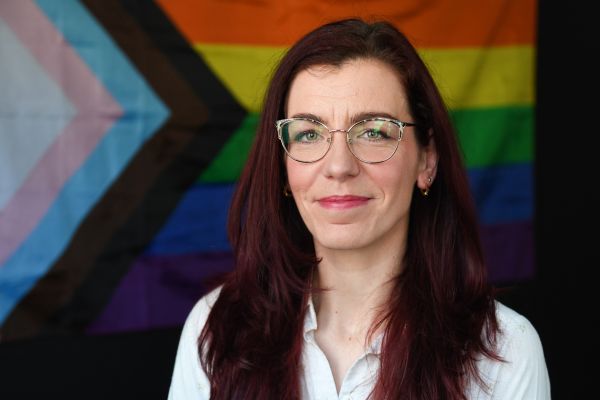


Same-sex couples are likely to face higher costs under Jersey's proposed new fertility treatment funding model which is "biased" towards heterosexual couples, experts say.
Health and Community Services published proposed criteria for In Vitro Fertilisation (IVF) funding earlier this year after politicians backed an amended proposition.
But experts have raised concerns that the proposed access criteria appears "biased towards heterosexual couples and does not take into account the LGBTQ+ community", with same-sex couples having to spend thousands on artificial insemination treatment before being considered.
In August, Health and Community Services published proposed criteria for IVF funding which would replace the current system that only funds the fertility treatment for couples with a combined income of less than £40,795.

Pictured: The proposed new eligibility criteria for would fund three IVF cycles for households with a gross annual income of less than £82,300.
The new criteria will be introduced from 1 January 2025 if the States Assembly approves the funding as part of the Government Plan debate, scheduled for November 2024.
However, alongside the financial criteria, couples must also meet a set of additional specifications to qualify for funding under the new model.
Part of this is the requirement for the couple to be in a stable relationship, for both partners to be childless, to be within a specified age and BMI range, adn have been resident in Jersey for at least 12 months.
The criteria also includes the requirement for the couple "be infertile".

Pictured: The proposed IVF funding model does not including funding for artificial insemination – which will disproportionally impact lesbian couples.
For heterosexual couples, this can be proved by being "unsuccessful in getting pregnant through regular unprotected sex for two years".
But homosexual couples must prove their infertility by using artificial insemination, and not becoming pregnant after 12 cycles.
Six of these cycles must have used intrauterine insemination (IUI).
IUI is a type of artificial insemination where sperm is placed directly into the uterus during ovulation – rather than through intercourse.
Each cycle of IUI costs upwards of £1,000 – meaning that same-sex couples will have spent over £6,000 before being able to access Government-funded IVF treatment.
In submissions addressed to the Health and Social Security Scrutiny Panel, both infertility charity Tiny Seeds and Women’s Health Hub reference this cost disparity – which has been dubbed a ‘gay tax’ by campaigners.
Meanwhile, Tiny Seeds wrote: “Same-sex couples may also struggle to access funded IVF treatment as they will be required to self-fund six cycles of IUI at approximately £1,000 per cycle plus medication, prior to qualifying for funded IVF.
“If they do not have the financial means to do so, they may not be able to access treatment.”

Pictured: The proposed new eligibility criteria for IVF will be introduced from 1 January 2025 if the States Assembly approves the funding as part of the Government Plan debate.
Gynaecology consultant Mr Neil Mclachlan and GP Dr Jessica Langtree-Marsh – both women's health experts from the Women's Health Hub – said that the "funding allocation criteria does not provide equitable access to all those needing IVF treatment" and criticised it as being "at risk of appearing outdated at the time of agreement".
They explained: “The current access criteria appear biased towards heterosexual couples and does not take into account the LGBTQ community.
“The process of becoming a parent for these individuals is already more difficult as the it almost always involves a third party.
“With this comes extra expense, which has dubbed by some as the ‘gay tax’.
“Homosexual couples within the UK are eligible for some funded assisted reproduction on the NHS and not considering this may appear prejudiced.”

Pictured: Kaye Nicholson is the CEO of equality and diversity charity Liberate Jersey.
Kaye Nicholson, CEO of equality and diversity charity Liberate Jersey, urged the Government to consider how such barriers for LGBTQ+ islanders seeking fertility treatment could be mitigated.
She explained: "It has historically been the case that LGBTQ+ couples encounter additional barriers to starting a family, which are not applicable to heterosexual couples, in respect of both IUI and IVF.
"Whilst it is therefore a positive step to see that same-sex female couples could be included within the proposed Government funded IVF, there remains a financial barrier for those couples to meet the criteria, as they are required to undertake a minimum of six IUI treatments, which are not funded.
"As Tiny Seeds have highlighted, at a minimum this would cost £6,000 which could prove a significant barrier for some wishing to access IVF treatment.
"As also highlighted by Jersey Women’s Health Hub, we would encourage the Government to consider how such barriers for LGBTQ+ people could be mitigated, in order to enable more equitable access to this type of important provision."
In 2022, the UK government promised fairer access to NHS fertility treatment for same-sex couples and single women, saying they would no longer need to privately fund rounds of artificial insemination before becoming eligible.
But a BBC investigation in 2023 found that only four out of 42 Integrated Care Boards (ICBs) in England – which make the final decision about who can have NHS-funded IVF in their local area – offer fertility treatment to same-sex couples who have not already paid privately for artificial insemination.
Married couple Megan and Whitney Bacon-Evans launched a landmark legal test case against the NHS in 2020 after learning of the financial burden placed on same-sex female couples and single women trying to start families.
They were “horrified” to learn that their local ICB required them to pay for 12 rounds of fertility treatment, including six rounds off IUI in a private clinic, to “prove” infertility before becoming eligible for NHS help.
In July 2023, the couple formally withdraw their case from the high court after Frimley ICB committed to an intention to introduce a new fertility policy.
View this post on Instagram
In a post on social media, Whitney and Megan said: "Frimley ICB recognise the need to update their policy to remove the inequality between same-sex female couples and cis heterosexual couples.
"This combined with the Government’s commitment to removing the barriers to accessing IVF for same-sex female couples in 2023 leaves us feeling very hopeful for the future of LGBTQ+ families."
The couple recently announced their pregnancy on social media, where they have over 140,000 followers.
In Wales, the requirement for IVF treatment is that female same-sex couples have to have proof of six failed attempts at IUI – but these attempts are funded by the NHS, rather than self-funded.
In Scotland, the policy is similar, where IVF will be provided after six to eight cycles of unsuccessful IUI which are also NHS-funded.
Comments
Comments on this story express the views of the commentator only, not Bailiwick Publishing. We are unable to guarantee the accuracy of any of those comments.